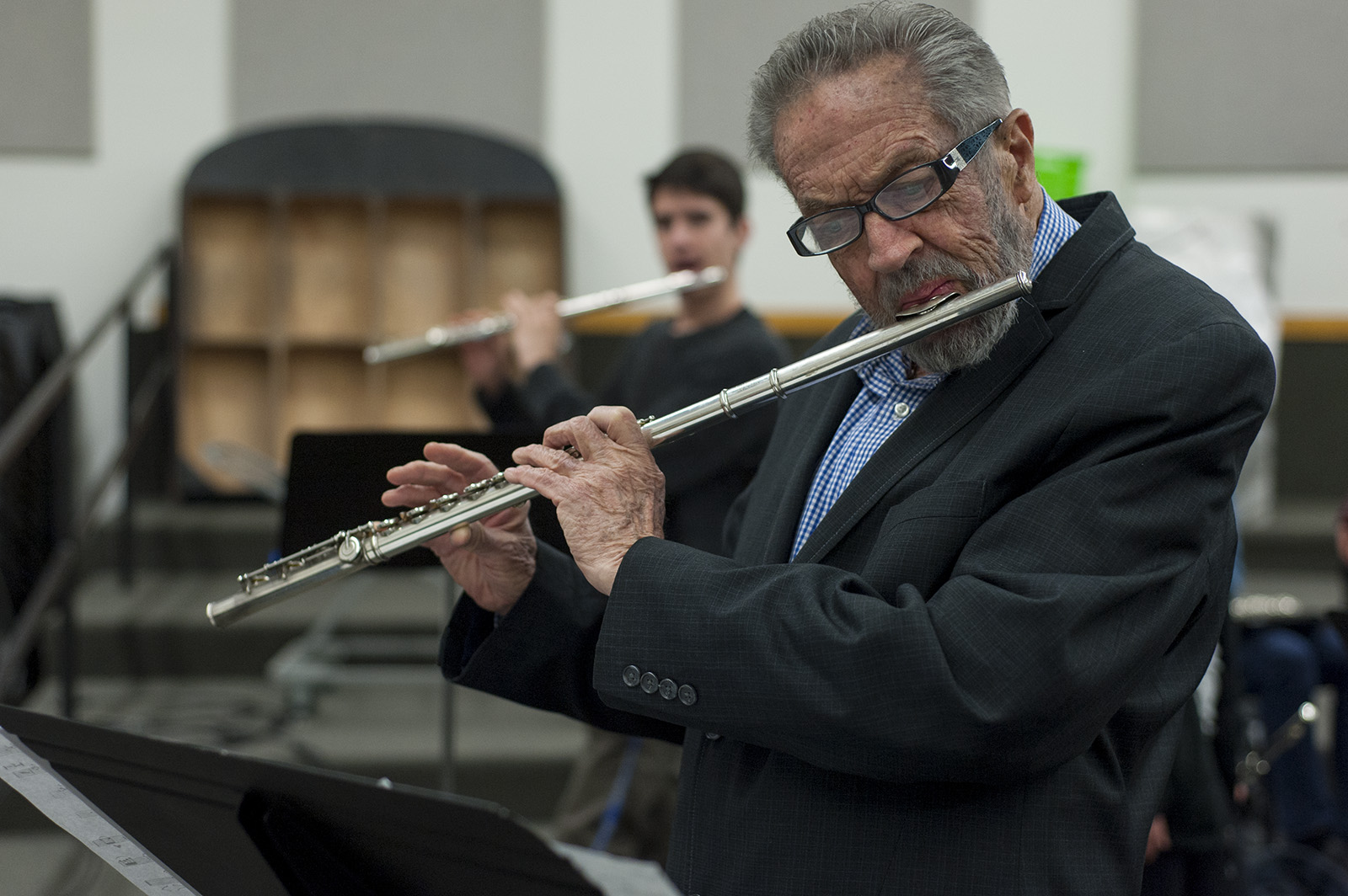Concert to honor musical, teaching legacy of flutist Sheridon Stokes

Senior lecturer Sheridon Stokes began teaching at UCLA in 1972 and will retire this year after 45 years. On Monday, students and faculty performing in the Annual Woodwind Faculty Concert will honor his career as a film flutist. (Esmeralda Lopez/Daily Bruin)
By Lisa Aubry
Feb. 26, 2017 10:23 p.m.
Flutist Sheridon Stokes has performed in every Annual Woodwind Faculty Concert since 1972, except for in 2008. That year, he was performing for the Academy Awards instead.
Stokes, a senior music lecturer, will perform in his last Annual Woodwind Faculty Concert on Monday because he is retiring this year after 45 years at UCLA. Stokes, joined by other UCLA faculty and students, will perform a program in tribute to himself.
The programming of the concert captures Stokes’ dual career at UCLA: Since starting at UCLA in 1972, Stokes has taught flute to students and maintained his personal musical career as a flutist for film. In addition to playing solo flute at the Academy Awards in 2008, Stokes also performed in 1997, and played the penny whistle solo from the “Titanic” song “My Heart Will Go On” with Céline Dion at the 1998 Academy Awards.
On Monday, one piece, “Magic of the Movies,” arranged by composer Peter Senchuk specifically for Stokes, melds together movie film scores Stokes played in during his musical career, including theme songs of “Out of Africa,” “Titanic” and the television show “Mission Impossible.”
“It is easy to put a regular musical program together,” Stokes said. “But less so one as sentimental that means something to me.”
[Related: UCLA students, professors to perform in ‘Woodwind World’]
Stokes’ own work in film music has enriched his teaching, he said.
In recording music, players must be alert and rapid to correct technical issues with the music, an experience that prepared Stokes to troubleshoot problems with his students’ techniques.
Student Amaris Hurtado said Stokes originally seemed intimidating at her audition for entry into the school of music because of his serious facial expression. During Hurtado’s first lesson with him, Sheridon smiled and asked her how she was doing, and she realized her initial judgement was wrong, said the fourth-year music and performance student.
Stokes’ teaching techniques put Hurtado at ease during lessons; the two chatted about classes, career advice and well-being, including mental health, before commencing a lesson.
“This major is very stressful sometimes, but lessons with Sheridon are very low pressure,” she said. “Lessons with Sheridon are a stress-free zone.”
Hurtado has met many students who dread going to weekly music lessons because they fear their teachers’ harsh criticisms or expectations to learn pieces on deadline, she said. But this is not the case for her hourlong weekly lessons. Stokes behaves more as a guide for her musical pursuits with gentle suggestions for improvement.
“He would say that it isn’t a wrong note, just a ‘different’ note,” Hurtado said.
Fourth-year English and music student Emily Tsai was mentally preparing for a nerve-wracking audition to join Stokes’ studio during winter quarter of her freshman year. Her worries were instantly diffused the moment she stepped into Stokes’ studio room, she said.
Expecting the spotless and spacious work space of a renowned flutist, Tsai instead found a cozy room with music books, photos of Stokes’ past students and plush armchairs. A computer sat atop his small desk, cluttered with sheets of music. Stokes fit a piano and collection of flutes from around the world into the small space, Tsai said.
Warm and welcoming, Stokes’s studio exudes the same atmosphere Tsai felt during her lessons with Stokes, she said, like the time Tsai was feeling down and Stokes sat at his piano to play and sing her the jazz standard “Emily.”
“I used to have performance anxiety and he cured that,” Tsai said. “He treated playing music less as work or occupation and more so as a way of life.”
[Related: Q&A: Lecturer, flute instructor discusses career, upcoming performance]
Stokes’s advice for student Miso Kwak was that music must come from within herself.
Stokes boosted her creativity, suggesting Kwak imagine her own narrative for music scores based on the emotions she wanted to convey, said Kwak, a fourth-year psychology student. Stokes coached her to practice by accenting on beats other than the typical down beat and to play with adding ornamentations.
“He told me that I must be like a politician when I play; I have to act like I know what I am doing,” Kwak said. “It’s a funny statement, but it speaks to how I can find my own interpretation of pieces and be unafraid of pursuing what I really want to try.”
A UCLA alumna from 1977, Anahid Nazarian was a flutist and student of Stokes’ who now works as a film producer. Although her career does not directly involve music, she still participates in amateur music groups. Stokes’ musical guidance has encouraged her to continue playing 40 years after graduation, she said.
“He possessed such an air of confidence and easygoing affability, learning from him was truly made pleasant,” Nazarian said.
Stokes is honored to have taught a diverse student body and looks forward to seeing what will become of all of his former students, he said.
“Of all the things I will miss about UCLA, the students will be number one,” Stokes said.


